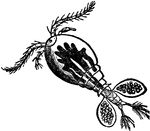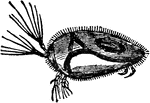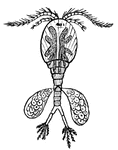Clipart tagged: ‘cyclops’

Cyclops
Cyclops, the representative of a number of lowly forms belonging to the order of Copepods, is one of…

Cyclops
"The best-known form of the Copepoda is the genus Cyclops, specimens of whch may be found in…

Water Flea
The Copepoda are represented by the cyclops, or water flea. This form is common in sluggish streams…

Cyclops communis Water Flea
"Water Flea is a popular name for minute aquatic Crustaceans such as daphnia, cypris, and cyclops. In…

Cypris Unifasciata Water Flea
"Water Flea is a popular name for minute aquatic Crustaceans such as daphnia, cypris, and cyclops. In…

Daphnia Pulex Water Flea
"Water Flea is a popular name for minute aquatic Crustaceans such as daphnia, cypris, and cyclops. The…

Polyphemus
"Theocritus asserts that there is no rememdy for Love but the Muses. He then gives an account of the…



